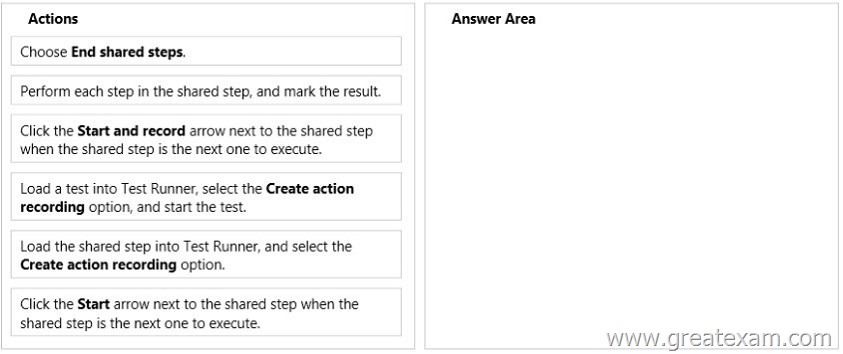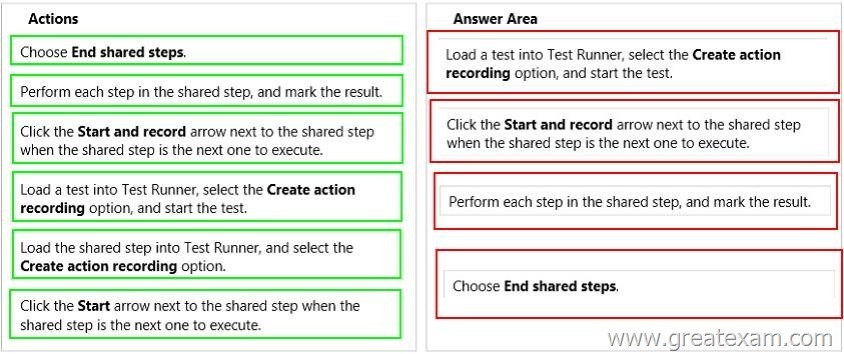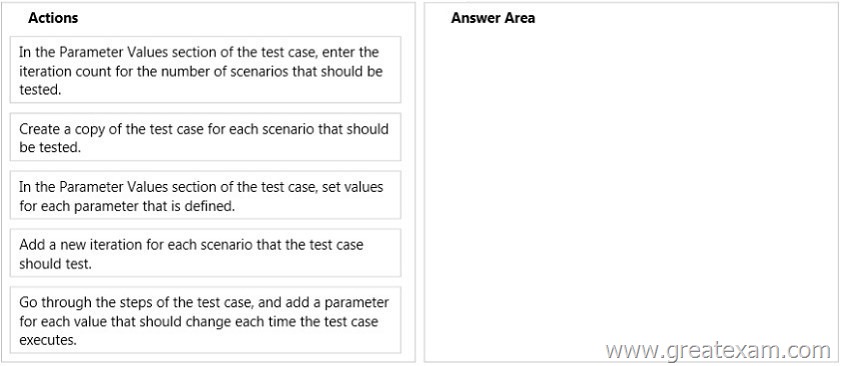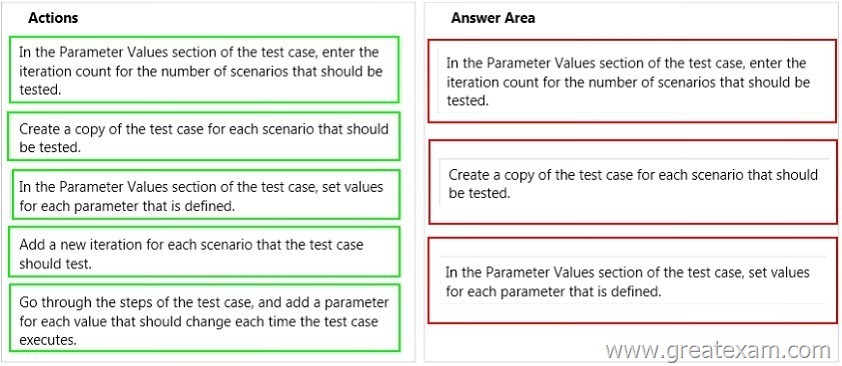2016 May Microsoft Official New Released 70-497 Q&As in GreatExam.com!
100% Free Download! 100% Pass Guaranteed!
Get latest GreatExam 70-497 practice test and pass your exam easily. Passing the test is not so difficult now, you can easily pass the exam with our correct and accurate collection of GreatExam 70-497 question answers.
Following questions and answers are all new published by Microsoft Official Exam Center: (The full version is in the end of the article!!!)
QUESTION 71
You are the QA lead for a development team.
You use the Agile process template.
Your testers use Microsoft Test Manager to author and run manual test cases.
The testers use requirement-based test suites to organize the test cases and link them to user stories.
You need to obtain testing status information, such as the number of tests that are passed, failed, or active.
You need this information broken down by user story.
Which SQL Server Reporting Services report should you view?
A. Stories Overview
B. Stories Progress
C. Test Case Readiness
D. Test Plan Progress
Answer: A
Explanation:
The Stories Overview report lists all user stories, filtered by area and iteration and in order of importance.
You can use this report to answer the following questions:
How much work does each story require?
How much work has the team completed for each story?
Are the tests for each story passing?
How many active bugs does each story have?
Reference: Stories Overview Report (Agile)
QUESTION 72
Drag and Drop Question
You are the lead product tester for your company.
You use Microsoft Visual Studio Ultimate to design and test your flagship product.
You restructure some of the testing to use shared steps.
You need to create an action recording for a shared step.
Which four actions should you perform in sequence? To answer, move the appropriate actions from the list of actions to the answer area and arrange them in the correct order.
Answer:
QUESTION 73
Drag and Drop Question
Your team uses Microsoft Test Manager (MTM) to manage your test cases.
You need to execute a test case multiple times.
Each time, the test case will have a different data value.
Which three actions should you perform in sequence? To answer, move the appropriate actions from the list of actions to the answer area and arrange them in the correct order.
Answer:
QUESTION 74
Your team uses the Microsoft Visual Studio Scrum 2013 process template in Microsoft Test Manager.
Your team wants to link all test cases to the related product backlog item or bug that they test.
You have a test case ID 121 and a product backlog item with ID 79.
What should you do?
A. Open the test case, and add a Parent link to product backlog item #79.
B. Open the product backlog item, and add a Related link to test case #121.
C. Open the product backlog item, and add a Child link to test case #121.
D. Open the test case, and add a Tests link to product backlog item #79.
Answer: D
Explanation:
http://msdn.microsoft.com/en-us/library/vstudio/ff731576(v=vs.110).aspx
Reference: Product Backlog Item (Scrum)
QUESTION 75
Your development team is working through their bug backlog and tracking their progress on the Bugs dashboard.
You look at the active bugs by assignment report and notice that the average size of your team members’ bands for active bugs is increasing over time.
You need to identify the issues blocking the team’s progress toward resolving and closing bugs.
Which issue should you investigate?
A. The bug backlog is divided evenly across the development team for resolution.
B. The test cases are outdated and are testing the wrong code.
C. The reactivated bugs that the development team is working through are resolving faster than expected.
D. The team has reallocated members to other non-priority tasks.
Answer: D
Explanation:
Bug progress indicators include:
– The band for active Bugs is becoming wider.
Questions to ask:
Are team members being reallocated to other, non-priority tasks?
Are other issues blocking the team’s ability to resolve and fix Bugs?
Reference: Bugs dashboard
QUESTION 76
Your company uses Lab Center during manual-and automated-testing processes for different types of testing environments.
Development operations is standardizing their processes.
They want to document their best practices for environment setup.
You need to verify your setup of a standard environment, which consists of physical servers that match your production environment.
However, you are unable to connect to your new lab environment.
Which action in Lab Center should you perform in order to troubleshoot the problem?
A. Repair
B. Manage
C. Connect
D. open
Answer: A
Explanation:
Q: The status of my lab environment is Not Ready. What should I do?
A: On the context menu of the environment, choose Repair.
The repair will take a few minutes.
This status means that the test agent is not installed and correctly configured on one of the machines in the environment.
The repair operation logs into the machines and installs and configures the agent.
Incorrect:
Not C: It is stated that the problem is that we are unable to connect.
Choosing to connect again would not help.
Reference: Standard lab environments
QUESTION 77
You are using Microsoft Test Manager (MTM).
You have developed a new test case.
You need to:
– Set the test case priority,
– Set the area where the test will be used, and
– Update the work item state to Ready.
What should you do?
A. Open the Test Configuration Manager view and change the area path, priority, and state.
B. Open the Test Plan Manager view and change the area path, priority, and state.
C. Open the test case work item and change the area path, priority, and state.
D. Open the test plan Properties view and change the area path, priority, and state.
Answer: C
Explanation:
Q: How do I change the state of test suites with TFS 2013. 3?
A: Open the test suite and change the state in the work item form.
QUESTION 78
You are using Microsoft Test Manager (MTM).
You are using the Microsoft Visual Studio Scrum 1.0 process template.
You need to generate a list of product backlog items (PBI) in MTM that have zero test cases.
What should you do?
A. Open each PBI and visually inspect the work item links.
B. Create a requirements-based test suite.
C. Click Requirements coverage in the Results view.
D. Create a Direct Links query.
Answer: D
Explanation:
Direct links query: Returns work items and any work items that are linked to these items
QUESTION 79
You are using Microsoft Test Manager (MTM).
You need to develop test cases that trace to a set of requirements.
What should you do?
A. Add the requirements as test step attachments.
B. Add links from the test cases to the requirements.
C. Add links from the test suite to the requirements.
D. Add the requirements as test case attachments.
Answer: B
Explanation:
Linking tests to use cases
If you are using Test Manager to design and run your tests, you can organize your tests under requirement, use case, or user story work items. You can link these work items to use cases in your model. This enables you to quickly trace requirements changes to the tests, and helps you track the progress of each use case.
To link tests to a use case
– uk.co.certification.simulator.questionpool.PList@9050870
In a use case diagram, right-click a use case and then click Link to Work Item.
– uk.co.certification.simulator.questionpool.PList@9050910
Reference: Developing Tests from a Model
QUESTION 80
You are using Microsoft Test Manager (MTM).
You have a shared steps work item that you want to hide in the Shared Steps Manager.
You need to ensure that only active shared steps work items are displayed.
What should you do?
A. Change the state of the shared steps work item to Closed, then customize the filter of the
Shared Steps Manager view to display shared steps that have the status Active.
B. Delete the shared steps work item from all test cases where it is used, then delete the
shared steps work item from the Shared Steps Manager.
C. For the shared steps work item, change the Show in Shared Step Manager setting to Do
Not Show.
D. Change the state of the shared steps work item to Removed.
Answer: A
Explanation:
– To change the state of shared steps to closed
From the Testing Center, choose Organize and then choose Shared Steps Manager.
The Contents pane is displayed.
To open the shared steps to change the state, double-click the shared steps that are listed in the Shared Steps manager pane.
Choose State and then choose Closed.
– To hide the closed shared steps, you can add the state column and filter by state.
– Right-click in the columns header of the shared steps manager.
A drop-down list of fields is displayed.
– To select the state field, choose State from the list of fields. Choose outside the drop-down list to close it and to add the field to the columns.
– To add a filter to the column to hide the closed shared steps, choose the dropdown arrow in the column header. Select Active to show only the active shared steps.
Reference: How to: Change the State of Shared Steps to Closed
We give you the proper and complete training with free 70-497 GreatExam updates. Our braindumps will defiantly make you perfect to that level you can easily pass the exam in first attempt.
2016 Microsoft 70-497 exam dumps (All 106Q&As) from GreatExam:
http://www.greatexam.com/70-497-exam-questions.html [100% Exam Pass Guaranteed!!!]